Jaynine Thompson was adopted as a child by her extended family, who joined the Church at about the same time. Even with knowing her adoptive parents loved her, she still struggled with feelings that she didn’t belong anywhere. The gospel and the Church have helped her know where she belongs, and she now works to extend that invitation of belonging to others.
(Traducida al español por Analia Hoole, Refugios Fuertes. Haz clic aquí para leer la entrevista original en español.)
Tell me about the beginning of your life.
I was born in Jersey City, in the state of New Jersey in the USA, and my biological parents were teenagers. Unfortunately, my father was never part of the story and my mother struggled with health issues, used alcohol and drugs, and was affiliated with gangs. I went into the foster-care system when I was about five while they tried to find extended family to take me. Thankfully, my now-dad, who was biologically my great half-uncle, cared about my biological mother and promised he would take care of me. My now-parents took foster classes so I would be able to live with family. And right around that time, we found the Church.
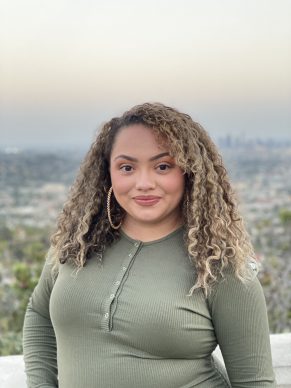
Jaynine Thompson
What do you remember about that?
My dad finding the Church is one of the funniest things to me! He would fall asleep to pay-per-view commercials, and one night he saw a commercial for a free Bible from The Church of Jesus Christ of Latter-day Saints. He called and they said, “We could have two guys deliver it within a few days or we can mail it there in a week or two.” And he said, “Have the people drop it off!” That’s when the missionaries showed up. They talked to him about the Bible and another free book, the Book of Mormon, and the lessons started. I remember feeling or seeing light around them! It was tough. We were a Hispanic household of avid coffee drinkers and there was social alcohol, but we were all baptized at that time except for my dad, who didn’t feel ready. He was a very active non-member, though, and even got a calling to help with Scouts. Around the same time, I was legally adopted by my family.
Which was the bigger change for you? Joining a family or joining a church?
I was more excited about my baptism than my adoption! Adoption is weird. It’s just a long day of people waiting in court to hold a paper. But I was so excited to be baptized, and I loved Elder Aston and Elder Bryner so much! I was so excited for Primary that I would run to class after sacrament meeting even though my parents hadn’t planned to stay. And then we’d stay because they felt guilty taking me out of Primary. But it didn’t last. Jersey’s a rough place to live and conflict with my biological mom was increasing. She lost her parental rights and instead of maintaining a good relationship with my dad, she became very angry. Threats and vandalism started happening, so they felt it was safest for us to move to Stroudsburg, Pennsylvania. As a kid, I didn’t realize what was happening, but as an adult I do. I loved them then, but my love for them has grown as I realized that they picked up and left for me. Unfortunately, in that move, we stopped going to church. We had a ward in Pennsylvania, of course, but it was kind of weird for us. We were fresh converts and no one really felt confident.
Around 2006, my dad decided to get baptized, too, but because none of the rest of us were active, eventually he went inactive, too.
When I was 18, I went through a rough time. I was in my freshman year in college and upset that I didn’t have any contact with my biological family. I started questioning my identity and lost a lot of self-worth. I started doing horribly in school and I was just very angry. I lost my belief in God.
Did you still think about your birth mom and wish you could connect, or did you feel the separation was for your own good?
I yearned for her, but I was angry at her for not doing her part, for not even trying to stay in touch. No cards, no ‘Happy Birthday’, nothing. I thought, if I had a child, I would do the impossible to see her. But that resentment ended up shifting to the parents who had adopted me. It led me to making some poor decisions. I started smoking marijuana and I drank alcohol. I lost the ability to care. I thought that if my own mom wouldn’t do her part to show she cared, then no one could really care about me. I just had no self-worth. I made the mistake of having pre-marital sex and my parents found out. My mom, as a very angry Hispanic mom, after doing everything she could to protect me… she just lost it. We had a huge fight and I tried to take my own life. I felt cornered. I didn’t believe in God. There had been a time when I did, when I was young, and I felt like He should have known that this young person needed Him so badly.
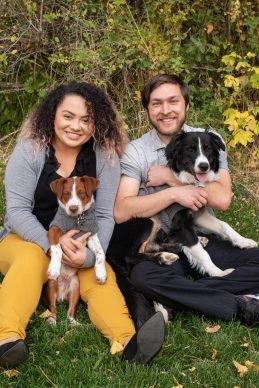
Jaynine Thompson with her husband
You were viewing Him like your birth parents.
Yes, just like they weren’t putting forth any effort, I thought He wasn’t. I didn’t want to live. I went to a rehabilitation center and was released after being treated. One day, I was helping my mom clean the house, and we were reminiscing about how times were easier before. The doorbell rang, and there was a set of Elders outside our door. I remember thinking, that’s a coincidence, right? They started coming by often for dinners because my family always wanted to feed the missionaries. One day they got ready to share a message and I was going to go back to my room. Elder Wright said, “Look, I don’t know for sure what you’re going through, but I think I do, because my brother went through it.” Then he said, “I want you to know that you’re loved. And that you have a friend.” At that point, they had invited us probably fifteen times to come back to church, but this time I committed to go.
I couldn’t drive, church was 45 minutes away, and I didn’t have church clothes. But my mom felt I needed to get back in touch with God. She bought me this terrible flowery dress that I hated SO MUCH because I did not want to wear anything cheerful and flowery. My brother Victor, who was in his twenties, would take me. He wasn’t happy, but I had committed. Everyone knew I needed it, so they were willing to sacrifice to make sure I was there. One Sunday a sister came up to us, “You’re the Villaltas, right?” When we said, “Yes,” she said, “We’ve been waiting to meet you for a long time. We’ve been praying for you and hoping you would come.” That helped my brother want to come, too.
When I was 19, I was called to be a teacher in the Relief Society. There was a little group of Spanish-speaking sisters and occasionally, someone would whisper-interpret the lessons for them. I’m bilingual, and I decided I wanted to be “Dora the Explorer” and teach in English and Spanish. I didn’t have a candy bowl or table decorations, but this was what I could contribute! So the Spanish-speaking sisters went from sitting in the back, always listening, never contributing, to discussing the gospel in their own language. When I translated the Spanish comments into English, people would often say, “Wow! I never thought of it that way!” Our Relief Society went from being segregated to the sisters communicating and bearing testimony to each other.
That’s so great that you found a way to change something that wasn’t working for your ward, in a way that brought the Spirit!
It was the coolest experience! If you have an opportunity to teach someone in their language, do it. Don’t just hand them a written version in their language for them to read. Make it more inclusive! Around that time, I realized I could be serving a mission, but I had made so many mistakes in my life I didn’t know if I qualified, or if they’d let me go on a mission. I finally got my courage up to meet with the bishop, and he said, “We can do this!” He warned me that the adversary was going to work hard on me, and it wasn’t going to be easy. My first thought was, Bring it! Well, a few weeks later, I had a car accident and couldn’t go to church, and lost my motivation to do anything church-related.
One day, my family came home from church and said there were sister missionaries in the ward and that they really wanted to meet me. I had a neck brace and felt awkward, but I went to church just so I could meet them. They were awesome! They knew I was struggling, so they asked for my help teaching in Spanish. We’d go teach a lesson, and then we’d come back and they’d teach me a lesson. They started teaching my grandma who lived with us. She was 82 and a die-hard Catholic! But those sisters were so special, and she committed to be baptized when she was 83. The sisters got in the water with her to help her with my brother and my mom because she was in a walker- it was a mega-baptism! So a lot of really cool things happened to prepare me for a mission, but there ended up being problems with my mission papers. They kept sending them back. I had to meet with LDS Family Services, and there were a lot of concerns. I’m an adopted child, I’ve had a lot of things happen in my life, and they were concerned about my being able to handle a mission.
And how did you feel when the papers kept coming back?
I was discouraged and started questioning. But at that point, we had been made a Spanish branch, and my branch president would not give up. He said, “You are going to serve a mission, and you are going to be the first missionary ever out of this branch!” In August 2014, I got my mission call to serve in the Arizona Scottsdale mission. And I knew that was where I needed to be. I had people waiting to hear from me. And I was going to have that cool glowy light that I remember seeing around the Elders the first time I met them. I felt like I was worth it.
Why do you think that getting your mission call changed that?
I think maybe the validation of knowing that God accepted my offering. I thought, well, if I have to sacrifice two years of dyeing my hair cool colors and wearing all these earrings and the clothes I want to wear, if I have to give up seeing my nieces and nephews that I love so much, and my grandmother, just so that you know that I am really trying, then I am willing to do it. So, when I got that call, I felt like maybe He had accepted the offering, and that He accepted me and forgave me.
But I still had months to prepare, and more trials came. I butted heads with my parents all the time and every time we had an argument, I decided I couldn’t go on a mission. Sometimes I felt like I was arguing with the wind, with the adversary, asking why so many hard things were happening. I got into such a bad argument with my parents that I ended up calling the branch president because I didn’t have anywhere else to go. At moments like this, I always felt, I don’t have anyone. My branch president and his wife and my parents agreed that I would stay with them. A week turned into a month and no one from my family reached out to me. Four days before I left, I reconnected with my parents and soothed hurt feelings. So I was home the last few nights before my mission. I had missed them so much that I almost didn’t want to get on the plane! I just needed that. I needed them.
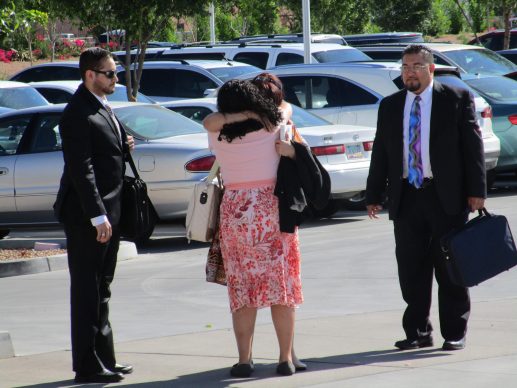
Jaynine meeting her family at Gilbert Temple for sealing
When I got to the MTC, my parents wrote me a letter apologizing for their faults and letting me know how much they supported me and my mission. When I called my parents at the end of the MTC, they told me they were going to the temple to be sealed, and my grandma and my brother were going as well! I just started crying! I couldn’t wait to finish my mission so we could all be sealed together. During my first interview with my mission president, I told him my parents were getting sealed, and I would be sealed with them when I finished my mission. I guess that stuck with him, because at Christmas he said, “Sister Villalta, for you to be a better missionary and teach the gospel of Jesus Christ, Sister Sweeney and I felt like we should give you a Christmas present and allow you, if your parents are willing, to get sealed right away.” They arranged for us to get sealed in the Gilbert Arizona temple! My family drove down and I remember seeing the Pennsylvania license plates in the parking lot and thinking, “It’s happening!” I remember closing my eyes, sobbing, and seeing nothing but pure brilliance. I was born to a different woman but I knew that this was my spiritual family.
I’d imagine there are a lot of people who don’t feel like their families fit the mold of what a family ought to look like. How did this journey shape what family means to you?
It’s something so profound. You have no idea how much they mean to me because they chose me. I think when people adopt kids, you choose them, they choose you, and that bond is stronger than blood or a document. When we chose to be sealed, I felt that we were celestial beings. And that can come about even if you don’t look like what you think a typical family should look like, because we definitely didn’t. My parents had a family of four. They didn’t need anyone else. They chose to take me in. And because of everything I’ve been through, I’ve spent a lot of time wondering about my purpose in life. Sometimes I ask God, “Where do you want me to be? Where am I supposed to be?” Because I would feel disconnected. I used to think I wasn’t part of their original plan, but now I wonder if maybe I was! I wonder if, before this life, we chose our family, and maybe we didn’t choose all the circumstances of getting together, but maybe we chose that at some point we would be present in each other’s lives, and we would help each other. My family has had our bumps, but I love them soooo much.
My grandmother passed away a few months after I returned from my mission. That was a really hard time. I started dating my husband, Paden, who I had served with on my mission. So we were Facetiming every night because I was in Pennsylvania and he was in Utah. He kept me in tune with the Spirit. We got engaged and started planning, and two months before our wedding I got a message that my biological parents were looking for me. I was almost 24, and suddenly after 14 years, you’re looking for me!? I had all those old identity issues again. All of my past came up and I didn’t know how to process it. I was trying to plan for this beautiful family-centered wedding day, and I had people I didn’t know claiming me as their child! I felt settled and had a mom and dad now, so I just focused on having the beautiful wedding day and sealing that we did.
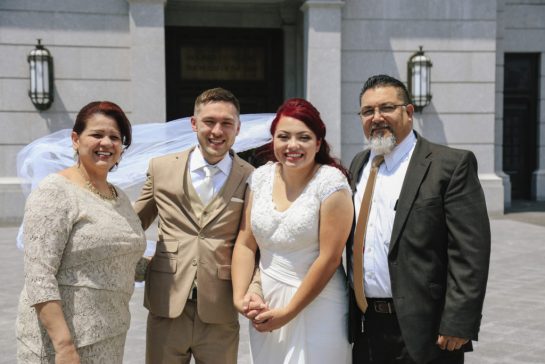
Jaynine Thompson with her husband and parents
Once I felt up to it, I told my biological father I wasn’t ready to know him. But I felt bad for my biological mom. She had been severely impacted by her life choices and I decided that, though I couldn’t change anything about her life, I could be present. I finally approached it as a missionary: look at her as a Child of God, put your own feelings aside, don’t be angry. I went from feeling angry to feeling bad because I don’t think anyone properly cared for her. All the drugs and alcohol had really affected her life and she wasn’t really literate. When Paden and I went to visit family in Pennsylvania in 2019, I told him I thought I needed to finally face her.
Why do you think that was?
Ironically, I kind of wanted my adopted mom to know I loved her. I was sealed to her. I chose her. And that she didn’t need to be hurt by any contact with my birth mom. I also decided I needed to see for myself what my birth mom’s circumstances were. I thought I would handle meeting her very missionary-esque, “Hello, nice to meet you…” Thank goodness Paden was with me, because I got to the gate of the house and she opened the door, and suddenly I felt again like I was that little five-year-old girl being sent away to foster care. She was crying, and we hugged each other, and the whole time, you know how you smile so hard sometimes that the muscles in your face hurt? I could not stop smiling the whole time. Paden noticed the two of us were wearing the same outfit — jeans shorts, sandals, flowery shirt, and a tight bun. It was so weird because I really did look like her. I went from you gave birth to me and I’m angry, to I feel charitable towards you, to I have more of a connection with you than I thought. I think I had been downplaying it to protect myself and my emotions. The visit helped me because there had been some wounds still eating at me. But now my adopted mom accepted that I am hers forever and it helped me cement my testimony even more.
How?
I think the whole time I was just mad, not just at my birth mom but at Heavenly Father. I think that there’s an idea that children in difficult family situations, children that go into foster care, those who have had bad things happen to them in childhood can’t be repaired. I thought that it was never going to get better, but He repaired it all. When everything came full circle, He softened everyone’s heart. Everything I was afraid of having to fix, He handled it.
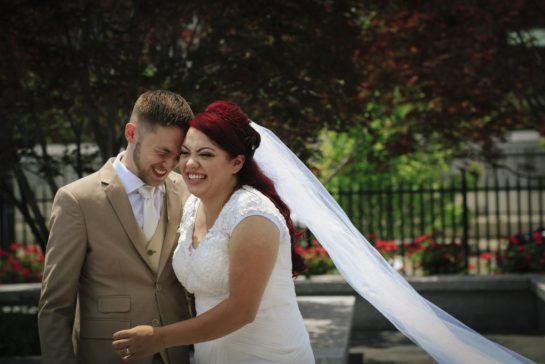
Jaynine Thompson with her husband
Tell me what your cultural and racial heritage means to you.
I feel strongly about that. I’m mostly Puerto Rican and part Salvadoran. My adopted mom is full Puerto Rican and my father is full Salvadoran. My adopted parents have dark skin. And, boy, is culture important in our family! It was cemented from what we ate every day to how we celebrated holidays to the way we conducted ourselves. It is cool that I can live my culture and also live the gospel and they actually work very well together.
Why is it important that we know that? Why is it important for us to have the perspectives of someone who is of a different race, language, and/or culture than us? Why was it important for your English-speaking sisters to hear the sisters from other countries discussing the gospel in Spanish?
First, those Spanish-speaking sisters sitting in the back of the Relief Society room got a chopped-up, watered-down version of the gospel. Interpreting is hard – you end up chopping up the language. It’s true you can learn from the Spirit, but the Spirit really confirms what is being said, so if what is being said isn’t understandable, I think the Spirit can have a harder time testifying. And some of those sisters were recent converts, so they didn’t have a base of knowledge yet. Second, make sure people feel like they belong! There’s the idea of keeping the circle open. We have to show we believe that women who have been in the Church for generations can still learn from new converts, or at least have something brought to their remembrance. People say all the time they learn from the Primary kids. How is that different from a new convert!?
Because it wasn’t just the Spanish-speaking sisters getting more out of those classes.
Oh no, the English-speaking sisters would tell me they loved the classes. There was an African-American sister who played piano but she never participated in the discussion. One day, as I was going back and forth translating, she participated! She told me that when I was teaching, it made her want to participate. I think, unconsciously, seeing someone who looks like you can trigger the idea that you belong. My Relief Society president started inviting other Spanish-speaking sisters to teach and I translated. They’d seen me do it so now they knew it was a possibility. I think we have to try and keep the circle open. I’m grateful for the changes the church tries to make, to keep us from feeling like a closed circle.
Anything else you’d like to share?
I feel like I’ve been given so many opportunities to share my testimony because of my mission, but you keep adding more and more to it and it cements what you already thought was a good testimony. And I know it might be too early to say, but I don’t think I could ever be done with this church. I know too much the power of Heavenly Father and what He has done for me. The gospel has literally saved me.
At A Glance
Name: Jaynine Thompson
Age: 29
Location: Logan, Utah
Marital History: Married
Occupation: Case manager for Homeless & Low Income families
Convert to the Church: January 12, 2002
Schools Attended: East Stroudsburg University and Utah State University
Languages Spoken At Home: English and Spanish
Favorite Hymn: Redeemer of Israel
Interview produced by Jenny Willmore
